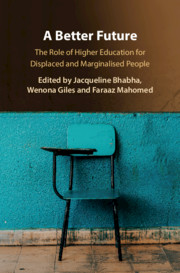Book contents
- A Better Future
- A Better Future
- Copyright page
- Contents
- Figures
- Tables
- Notes on Contributors
- Introduction
- Part I Encountering Marginalisation
- Chapter 1 Disparities in Participation in Higher Education among Migrants
- Chapter 2 Access to Higher Education and Retention of Students with a Migrant Background in the Netherlands
- Chapter 3 Roma in Higher Education
- Chapter 4 Higher Education in Exile
- Chapter 5 Continuing Inequalities in South African Higher Education
- Chapter 6 Inequities in US Higher Education Access and Success
- Chapter 7 Exploring Place
- Part II Deconstructing Marginalisation
- Part III Confronting Marginalisation
- Index
- References
Chapter 5 - Continuing Inequalities in South African Higher Education
The Changing Complexities of Race and Class
from Part I - Encountering Marginalisation
Published online by Cambridge University Press: 06 September 2020
- A Better Future
- A Better Future
- Copyright page
- Contents
- Figures
- Tables
- Notes on Contributors
- Introduction
- Part I Encountering Marginalisation
- Chapter 1 Disparities in Participation in Higher Education among Migrants
- Chapter 2 Access to Higher Education and Retention of Students with a Migrant Background in the Netherlands
- Chapter 3 Roma in Higher Education
- Chapter 4 Higher Education in Exile
- Chapter 5 Continuing Inequalities in South African Higher Education
- Chapter 6 Inequities in US Higher Education Access and Success
- Chapter 7 Exploring Place
- Part II Deconstructing Marginalisation
- Part III Confronting Marginalisation
- Index
- References
Summary
Using higher education sociologist Martin Trow’s analytic framework, the South African system became a mass system in 2013 when 16.3 per cent of the eligible cohort among people classified African enrolled in higher education. The purpose of this contribution is to critically engage with the important achievement of massification in South African higher education and to understand the changing nature of inequality. The question is whether inequality is still primarily racial, or is it, as the sociologist David Cooper suggests, taking a different form? His argument is that with massification has come what he calls ‘restratification’ of the social character of the South African university. Race remains pertinent as a social determinant in his analysis but class, which was always a factor in the South African social dynamic, has become significantly more important in the post- apartheid period. This chapter argues that this development has not significantly been assimilated into and made part of higher education analyses or commentary on the changing form of the higher education system and how policy should be developed to deal with access.
- Type
- Chapter
- Information
- A Better FutureThe Role of Higher Education for Displaced and Marginalised People, pp. 106 - 128Publisher: Cambridge University PressPrint publication year: 2020



